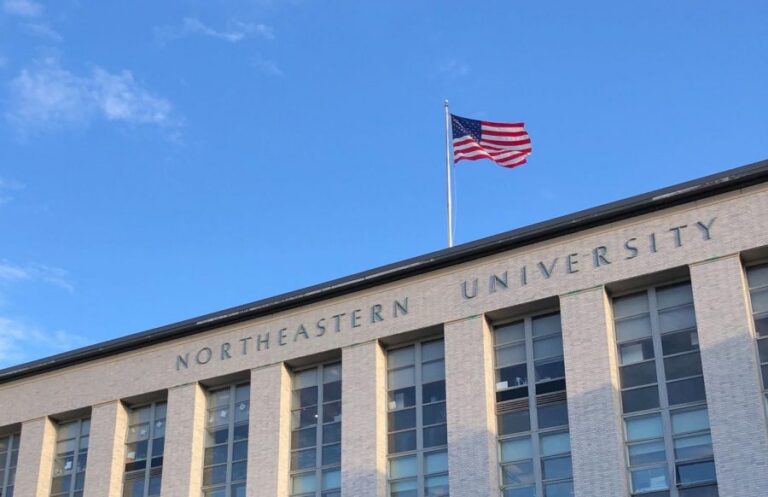Niche.com ranked Northeastern No. 2 in its 2021 list of the most liberal colleges in the United States, but leaders of campus political organizations say that doesn't accurately reflect the diverse political views many Northeastern students hold.
The ranking is calculated by surveying students about their own political preferences and those they observe on campus. Niche.com lists Northeastern only behind American University, but students say Northeastern's campus politics aren't so easily labeled.
“To say that Northeastern is one of the most liberal universities doesn't accurately describe the diversity of political thought on campus because it's really easy to boil down people's ideologies into liberal and conservative, but it's actually a lot more complicated,” said Joshua Sisman. second-year political science and economics major and communications director of the Young Democratic Socialists of America, or YDSA.
Massachusetts has he voted Democrat in every presidential election since 1984. Boston is no exception. According to recent enrollment records, over 1.5 million Bostonians were registered Democrats last October. At Northeastern, one of the city's largest institutions of learning, students encounter a more mainstream liberal student population. However, conservative students across campus have still found ways to connect and voice their opinions.
Benjamin Smith, a third-year political science major and vice president of the Northeastern University College Republicans, or NUCR, has found a particularly strong community in the club and is unfazed by the university's Niche.com ranking.
“I think what's been cool about the College Republicans — and I don't know if it's true of other political clubs — but, you can tell we're really close,” he said.
Smith said he relishes the opportunity to bolster his arguments in discussions with left-leaning students both inside and outside of classrooms.
“There is no real hostility if I or any other NUCR member tries to disagree with the political left,” he said.
Natalie Hill, president of the Northeastern University College Democrats, or NUCD, had a different experience when it came to political discourse at Northeastern. Hill said she had a wake-up call at a debate hosted by NUCD and NUCR last semester, which was widely attended by students on both sides of the aisle. He said it was the first time he realized the prevalence of conservative ideas on campus.
“The chat box on that Zoom conversation was pretty active with people, frankly, throwing out conspiracy theories, repeating jargon that you hear from the alt-right in our country, things that aren't true, different tropes about Democrats and things like that going on from people on the left, too,” Hill said. “I think we're in a place where we're so polarized and things are so extreme for some good reasons. There's just so much demonization of the other side that we've kind of lost it.”
Hill went on to say that the debate was not something the groups were ready for, despite their hopes for productive political discourse.
Organizations that go beyond discussions and make efforts to organize for change, such as YDSA, are often shut down by the university, Sisman said. In fall 2020, YDSA fought for a universal pass/fail option for the semester, which the university refused to implement despite a unanimous Senate resolution from the Student Government Association, or SGA.
Sisman, a co-author of the pass/fail resolution, said, “It doesn't matter how liberal your students are if the university is not receptive.”
“
I think university students, on either side of the spectrum, would do well to listen to the opposing side, the opposing views, to really look critically at the media they consume and the messages they consume, because I think everyone has blind spots.
— Natalie Hill
The YDSA has also faced resistance from the university on issues such as increasing funding for University Health and Counseling Services, or UHCS, prioritizing affordable student housing, or reducing the price of meal plans.
“If you want to draw a Northeastern parallel to being a government, instead of increasing welfare programs on campus — you can imagine the meal plan and UHCS being welfare programs — they're putting it into things that are fancy.” Sisman said.
Hill has seen firsthand how the university tends to shut down the changes that liberal student organizers hope to implement when the NUCD signs on to the YDSA referendums.
“I think the administration is so careful and sensitive about anything that might be perceived as political, that it really blocks things that shouldn't be political,” Hill said.
Despite the challenges, students were able to make some real changes on Northeastern's campus. Both Sisman and Hill reported its success Coalition for Affordability, Accountability and Equity, or NUCARE, to influence the university pandemic response.
Students find that a clean categorization of Northeastern as among the most liberal universities in the country doesn't account for the complexities that come with being politically active on a campus, especially in an era as polarizing as today's.
“I think university students, on either side of the spectrum, would do well to listen to the opposite side, the opposing views, to really look critically at the media they consume and the messages they consume, because I think everyone has blind spots. Hill said.



